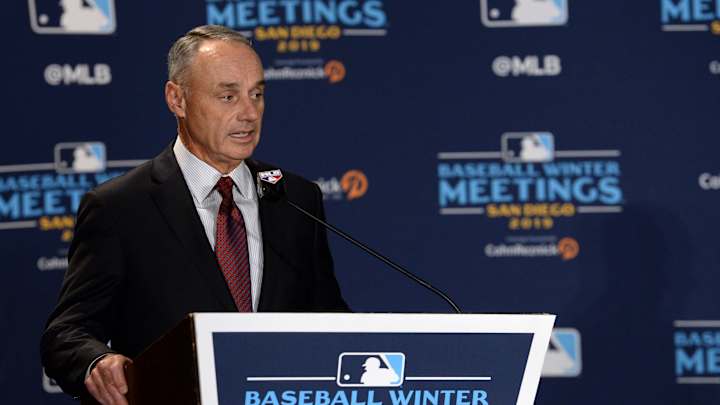Report: MLB 'Almost Certain' To Have First Work Stoppage in 26 Years

Any optimism between Major League Baseball and the Players Association (MLBPA) is rapidly dissipating.
Baseball’s ninth work stoppage—the first in 26 years—is "almost certain" to start Dec. 2, according to a report by Ronald Blum of the Associated Press. The league and the players union have been in negotiations since last spring, and the two sides have yet to make any proposals that provide any optimism for a new Collective Bargaining Agreement.
The current CBA expires at 11:59 p.m. EST on Dec. 1.
The last work stoppage in baseball was the infamous players strike that prematurely ended the 1994 season and led to the cancellation of the World Series. Since then, the league and the players have been able to maintain labor peace, negotiating new agreements in 2002, 2006, 2011, and 2016 ahead of the required deadlines. However, the two sides have not been without their issues.
The 2002 agreement wasn't agreed upon until 3 1/2 hours ahead of the deadline, which would have led to another players strike. And last year, the two sides bickered over the economics of the game while attempting to return to play during the COVID-19 pandemic. Ultimately, MLB and the MLBPA were unable to come to an agreement, and commissioner Rob Manfred was forced to implement a 60-game season.
The discord between the two sides has evidently carried over into labor negotiations. While the lack of a new agreement won't immediately have a long-term effect on the game, it would come with some damaging consequences.
MLB may impose a signing freeze, or clubs and/or players could be hesitant to sign hefty contracts with the terms of a new CBA not yet known. Either way, having the free agent market come to a crashing halt—with such a deep and talented class—could put a bad taste in the mouth of fans. In addition, a freeze in the marketplace could lead the league to consider a cancellation the Winter Meetings, which is the marquee event of the MLB offseason.
Then, of course, a lockout would threaten the beginning of spring training and the 2022 regular season. Blum writes that the current pace of negotiations is similar to the labor talks that led to a work stoppage in 1989-90, when the old agreement expired Dec. 31 and owners announced on Jan. 9 that a lockout would begin Feb. 15 without a new deal. An agreement was eventually reached March 1, and Opening Day was delayed a week until April 9, causing 78 games to be postponed and rescheduled.
The luxury tax system will be a hot topic in this round of CBA negotiations. The Athletic reported in August that MLB's first CBA proposal included a $100 million salary floor and $180 million luxury tax threshold with tax rates beginning at 25 percent. The current CBA does not have any salary floor and the luxury tax threshold is $210 million with rates beginning at 20 percent.
The players did not respond well to the proposal, viewing a salary floor as an introduction to an eventual salary cap. The players have vehemently opposed anything resembling a salary cap for decades.
In addition, a lower luxury tax threshold could deter clubs from maintaining higher payrolls, meaning smaller contracts for players and could even impact free agent negotiations this winter. Since 2017, the average MLB salary has dipped from $4,097,122 to around $3.7 million in 2021. So, if anything, players would want to see the luxury tax threshold raised, not lowered, to incentivize spending.
What a Lockout Means For The Texas Rangers
It's some bad luck. The Rangers are locked and loaded, ready to spend money on multiple impact free agents. The year they're finally ready to unload cash is the year the league could go into a signing freeze if the two sides can't reach an agreement.
The topic came up in the Rangers postseason press conference, and president of baseball operations Jon Daniels and the rest of the front office are prioritizing their plans ahead of how the CBA negotiations could impact the market.
"It's really out of our control," Daniels said on Oct. 6. "We're going to prepare as a team would with our aspirations. We're hopeful that the CBA is resolved quickly and quietly for the good of the game, for all parties, primarily for our fans. If we have to adjust, we will, but we're focused on putting our plans together. We'll look to move forward as quickly as we can within reason."
With only $28 million on the books for next season, the Rangers could make a huge jump in payroll and still be considerably under the new luxury tax threshold. That could give them an advantage in pursuing free agents early. Other clubs who are closer to the current threshold may want to wait and see what the next threshold will be before taking on additional large contracts.
However it plays out, the expiring CBA will be play a major factor in the MLB offseason. The quicker the new CBA is knocked out, the better it is for the game.
Make sure to like SI's 'Inside The Rangers' on Facebook
